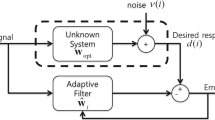Abstract
A robust recursive least-squares (RLS) adaptive filter against impulsive noise is proposed for the situation of an unknown desired signal. By minimizing a saturable nonlinear constrained unsupervised cost function instead of the conventional least-squares function, a possible impulse-corrupted signal is prevented from entering the filter’s weight updating scheme. Moreover, a multi-step adaptive filter is devised to reconstruct the observed “impulse-free” noisy sequence, and whenever impulsive noise is detected, the impulse contaminated samples are replaced by predictive values. Based on simulation and experimental results, the proposed unsupervised robust recursive least-square adaptive filter performs as well as conventional RLS filters in “impulse-free” circumstances, and is effective in restricting large disturbances such as impulsive noise when the RLS and the more recent unsupervised adaptive filter fails.
Similar content being viewed by others
References
Haykin S. Adaptive Filter Theory. 4th ed. New Jersey: Prentice Hall, 2002
Sun J, Chen J, Liu G P, et al. Delay-dependent robust H∞ filter design for uncertain linear systems with time-varying delay. Circ Syst Signal Pr, 2009, 28: 763–779
Shi P, Mahmoud M, Nguang S K, et al. Robust filtering for jumping systems with mode-dependent delays. Signal Process, 2006, 86: 140–152
Chan S C, Zou Y. A recursive least M-estimate algorithm for robust adaptive filtering in impulsive noise: fast algorithm and convergence performance analysis. IEEE Trans Signal Proces, 2004, 52: 975–991
Xia T, Wan Q, Wang X, et al. 2-D DOAs estimation in impulsive noise environments using joint diagonalization fractional lower-order spatio-temporal matrices. Sci China Ser F-Inf Sci, 2008, 51: 1585–1593
Weng B, Kenneth E B. Nonlinear system identification in impulsive environments. IEEE Trans Signal Proces, 2005, 53: 2588–2594
Seong R K, Efron A. Adaptive robust impulse noise filtering. IEEE Trans Signal Proces, 1995, 43: 1855–1866
Jayant N. Average- and median-based smoothing techniques for improving digital speech quality in the presence of transmission errors. IEEE Trans Commun, 1976, 24: 1043–1045
Zou Y, Chan S C, Ng T S. A recursive least M-estimate (RLM) adaptive filter for robust filtering in impulsive noise. IEEE Signal Proc Let, 2000, 7: 324–326
Zou Y, Chan S C, Ng T S. Least mean M-estimate algorithms for robust adaptive filtering in impulse noise. IEEE Trans Circuits II, 2000, 47: 1564–1569
Vega L R, Rey H, Benesty J, et al. A new robust variable step-size NLMS algorithm. IEEE Trans Signal Proces, 2008, 56: 1878–1893
Vega L R, Rey H, Benesty J, et al. A family of robust algorithms exploiting sparsity in adaptive filters. IEEE Trans Audi Speech Lang Pr, 2009, 17: 572–581
Vega L R, Rey H, Benesty J, et al. A fast robust recursive least-squares algorithm. IEEE Trans Signal Proces, 2009, 57: 1209–1216
Awate S P, Whitaker R T. Unsupervised, information-theoretic, adaptive image filtering for image restoration. IEEE Trans Pattern Anal, 2006, 28: 364–376
Makov U. Approximations to unsupervised filters. IEEE Trans Automat Contr, 1980, 25: 842–847
Zeitler G C, Singer A C. Universal linear least-squares prediction in the presence of noise. In: Proceedings of IEEE/SP 14th Workshop on Statistic Signal Process. New York: IEEE Press, 2007. 611–614
Zinkevich M. Online convex programming and generalized infinitesimal gradient ascent. In: Lane T, ed. Proceedings of the 20th International Conference on Machine Learning. Menlo Park: AAAI Press, 2003. 928–936
Moon T, Weissman T. Universal FIR MMSE filtering. IEEE Trans Signal Proces, 2009, 57: 1068–1083
Weissman T, Ordentlich E, Weinberger M J, et al. Universal filtering via prediction. IEEE Trans Inform Theory, 2007, 53: 1253–1264
Rousseeuw P J, Leroy A M. Robust Regression and Outlier Detection. New York: Wiley, 1987
Author information
Authors and Affiliations
Corresponding author
Rights and permissions
About this article
Cite this article
Chen, J., Ma, T., Chen, W. et al. Unsupervised robust recursive least-squares algorithm for impulsive noise filtering. Sci. China Inf. Sci. 56, 1–10 (2013). https://doi.org/10.1007/s11432-011-4458-6
Received:
Accepted:
Published:
Issue Date:
DOI: https://doi.org/10.1007/s11432-011-4458-6




